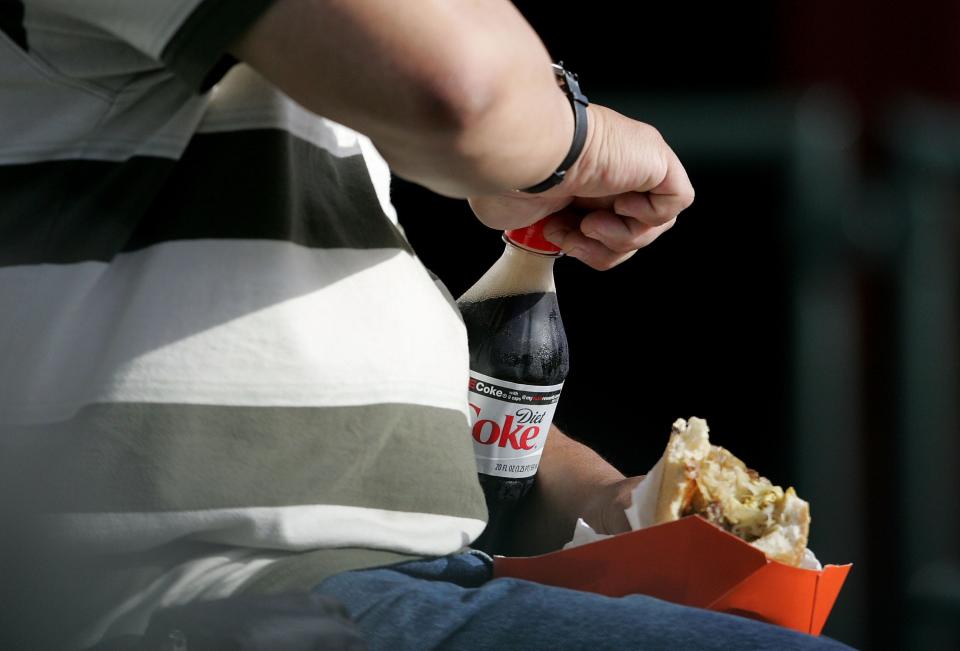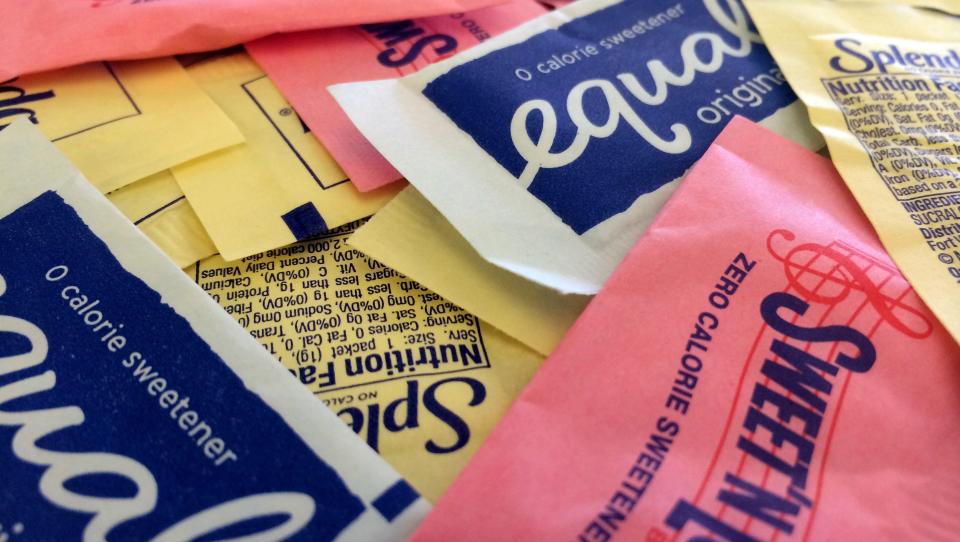Why did World Health Organization call this popular artificial sweetener 'possibly carcinogenic'?
- Oops!Something went wrong.Please try again later.
Leave it to the World Health Organization (WHO) to spark a controversy about a product that untold scores of millions of people worldwide have been consuming for decades.
Last month the WHO’s International Research Agency on Cancer (IARC) announced that the artificial sweetener aspartame — an ingredient that’s in more than 5,000 food, beverage and candy products — was “possibly carcinogenic to humans.”
But to further confuse the situation, another WHO group, the Expert Committee on Food Additives, did not change its threshold for the daily amount of aspartame that is safe to consume: 40 milligrams per kilogram of body weight. (This would calculate, for example, to a 155-pound person being able to “safely” consume around 14 cans of Diet Coke per day.)
More Health Matters: CNN's Dr. Sanjay Gupta, Surgeon General Dr. Vivek Murthy on parenting in the digital age

Aspartame has been in the American food supply since the U.S. Food and Drug Administration approved it in 1974. Current FDA guidelines put the safe daily consumption figure at 50 milligrams per kilogram of body weight.
Among the vast array of products that contain aspartame — which experts say is 200 times sweeter than sugar but is also calorie-free:
Tabletop sweeteners
Diet/sugar-free sodas and drink mixes
Sugar-free gum
Cereals
Energy bars
Gelatin-based products
Almost immediately the FDA responded to the report, saying that it “disagrees with IARC’s conclusion that these studies support classifying aspartame as a possible carcinogen to humans. FDA scientists reviewed the scientific information included in IARC’s review in 2021 when it was first made available and identified significant shortcomings in the studies on which IARC relied.”
Healthy ways to beat the heat: 17 best indoors activities to beat the heat in Palm Beach county
Likewise, American Beverage, a trade association representing the non-alcoholic beverage industry, noted in its rebuttal statement that “there is a broad consensus in the scientific and regulatory community that aspartame is safe. It’s a conclusion reached time and time again by food safety agencies around the world. The fact that food safety agencies worldwide, including the FDA, continue to find aspartame safe makes us confident in the safety of our products.”

Why did the WHO say this now?
It’s hard to understand why the WHO would suddenly take this position.
In fact, it admits that its studies have yielded “limited evidence” that the substance could be carcinogenic.
The WHO’s cancer research group said it “classified aspartame as possibly carcinogenic to humans on the basis of limited evidence for cancer in humans (specifically, for hepatocellular carcinoma, which is a type of liver cancer). There was also limited evidence for cancer in experimental animals and limited evidence related to the possible mechanisms for causing cancer.”
At a press conference in Geneva, Switzerland, one of the organization’s leaders tried to further explain.
“Cancer is one of the leading causes of death globally. Every year, 1 in 6 people die from cancer,” said Dr. Francesco Branca, the WHO’s director of the Department of Nutrition and Food Safety. “Science is continuously expanding to assess the possible initiating or facilitating factors of cancer, in the hope of reducing these numbers and the human toll. The assessments of aspartame have indicated that, while safety is not a major concern at the doses which are commonly used, potential effects have been described that need to be investigated by more and better studies.”
That said, Branca also noted that “the main conclusion of the panel was that there is no convincing evidence from experimental or human data that aspartame ... has adverse effects at the acceptable daily intake of ... zero to 40 milligrams per kilogram body weight.”
Got all that?
Longtime confusion over safety of artificial sweeteners
According to the American Cancer Society, concerns about aspartame causing numerous health conditions — including cancer — have been around for decades.
The ACS notes that “some of the concerns about cancer stem from the results of studies in lab rats published by a group of Italian researchers in the late 2000s, which suggested aspartame might increase the risk of some blood-related cancers (leukemias and lymphomas) and other types of cancer. However, these studies had some limitations that made their results hard to interpret. The results of epidemiologic studies (studies of groups of people) of possible links between aspartame and cancer (including blood-related cancers) have not been consistent for most cancers. Some studies have suggested a possible link, but others have not.”
A recently published piece by Australian nutritionist Evangeline Mantzioris in The Conversation explained that the WHO’s IARC relied on “only three human studies that looked at cancer and aspartame intake. These large observational studies used the intake of soft drinks as an indicator of aspartame intake. All three found a positive association between artificially sweetened beverages and liver cancer in either all of the population they were studying or sub-groups within them. But these studies could not rule out other factors that may have been responsible for the findings.”
In other words, correlation does not necessarily equal causation.
Two doctors who spoke with CNN — Dr. Ryan Marino, a specialist in medical toxicology at University Hospitals in Cleveland; and Dr. Qi Sun, an associate professor of nutrition and epidemiology at Harvard’s School of Public Health — urged consumers of artificial sweeteners not to be overly concerned about these latest public health statements.
“While there is a lot of attention has been paid to this, the concerns are probably being overblown,” said Marino.
Sun believes that “the evidence is pretty sparse” to make any definitive conclusions about aspartame’s potential for being carcinogenic.
So how should you proceed?
While most nutritionists would recommend that you avoid all unnecessary sugar and artificial sweeteners, that may not be realistic for your lifestyle.
And this is where, like with most things in life, moderation is the key.
Barry Popkin, a University of North Carolina nutrition professor characterized the current WHO position as a proceed with caution advisory.
“It’s a slight warning to people but it’s not ‘do not consume,’” he told NBC News. “Consume moderate levels and you’re OK.”
This article originally appeared on Palm Beach Post: Unpacking the WHO warning about aspartame and cancer

